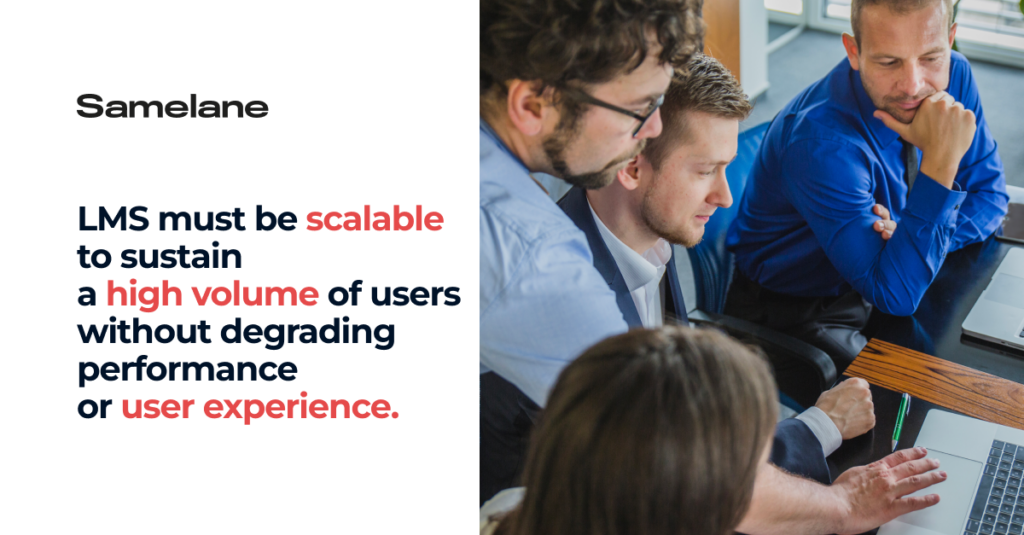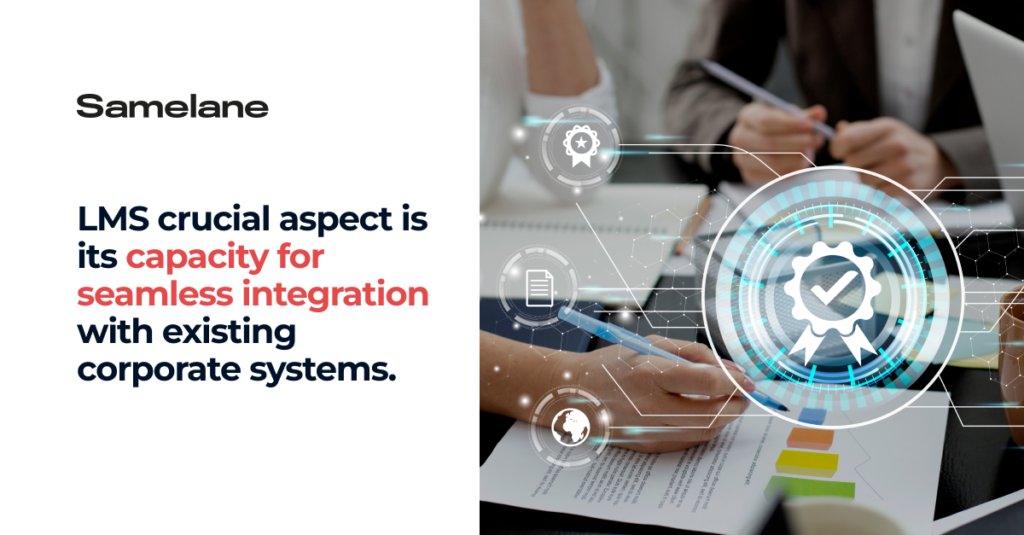Learning Management Systems (LMS) have risen to prominence in corporate training and development, serving as essential platforms for the organization, delivery, and monitoring of educational content and training initiatives. These systems ensure smooth knowledge dissemination, allowing companies to track advancements, evaluate performance, and adhere to relevant industry norms and guidelines. Within the dynamic setting of the business world, LMS solutions bring the necessary versatility and expandability to bolster ongoing learning and development efforts, promoting an environment of perpetual growth and flexibility among employees, partners, and vendors.
Custom LMS mirrors the corporate brand, aligns with specific operational processes, and offers pertinent and engaging content to the learners. The ability to modify and adjust the LMS to meet changing educational requirements, integrate with various business systems, and capitalize on emerging technologies further enhances the learning journey.
These features collectively guarantee that the corporate Learning Management System remains a vital and impactful resource for nurturing talent, boosting partner engagement, and propelling the company towards its strategic objectives.

Corporate Learning vs. Specific Industry Demands
The spectrum of goals for learning and development (L&D) significantly differs from one industry to another, mirroring each sector’s distinct challenges, regulatory frameworks, and business ambitions. For example, L&D initiatives in the manufacturing sector will likely concentrate on safety measures, enhancing operational efficiency, and keeping abreast of technological progress to match the pace of the fourth industrial revolution. In contrast, the insurance sector might emphasize ensuring compliance and boosting awareness of products and services among employees, franchise holders, and suppliers.
As a result, each sector’s L&D aims are customized to meet its unique requirements, sparking the need for custom Learning Management System solutions that can support a wide variety of content, teaching methods, and desired learning outcomes.
Expanding LMS Across Broad, Varied, and Spread-out Workforces
Expanding a custom Learning Management System to cater to the complex needs of broad, varied, and geographically spread-out workforces brings several challenges. Firstly, it’s essential to provide uniform training and development opportunities to a global employee base, navigating through the complexities of various time zones and languages. This demands an LMS capable of supporting localized content and providing flexible access options.
Furthermore, scalability in managing users is critical, necessitating a Learning Management System that efficiently manages many users, each with distinct access rights, roles, and learning trajectories. The platform must also be scaleable enough to sustain a high volume of users simultaneously without degrading performance or user experience.
Lastly, the varied learning preferences and needs across an international workforce call for a bespoke custom LMS that can offer diverse learning formats, from conventional e-learning modules to bite-sized learning and interactive gamified experiences. Such a degree of adaptability and customization is crucial for engaging participants and fulfilling the wide-ranging L&D goals of a global organization.

Customizing the Learning Experience in Management Systems
Customizing Learning Management Systems (LMS) is crucial in elevating the learning experience by addressing an organization’s specific needs and aligning with individual learners’ preferences. This flexibility improves the user experience and fosters a strong connection with the brand, leading to more effective learning results.
Incorporating Brand Identity into Learning
Through customization, organizations can integrate their brand identity into the LMS, effectively making the platform an extension of their corporate persona. This integration may include logos, color schemes, and themes that reflect the company’s branding. An LMS designed this way promotes a sense of connection and engagement among users by providing a learning environment consistent with the organization’s culture.
Additionally, having a unified brand identity within the custom LMS emphasizes the company’s values and mission, strengthening the bond between the organization and its employees and partners. This uniformity in branding and user experience across various platforms helps solidify the corporate identity and fosters engagement.
Personalizing Learning to Fit Individual and Departmental Needs
A key benefit of custom LMS is the capacity to design learning paths and content that cater to the specific objectives of individuals, departments, and partners. Administrators can tailor courses, modules, and educational materials to address particular roles, providing a complete knowledge base for all stakeholders.
For instance, while the sales team might benefit from training focused on customer relationship management and negotiation tactics, the technology department might require education on digital tools and specific procedures.
Such customization ensures that the content is relevant and directly contributes to the efficiency and effectiveness of the training. It supports personalized learning journeys that allow users to advance at their own pace and according to their unique learning preferences. This strategic alignment with organizational goals creates a more engaged and capable environment.
Improving Engagement with Custom LMS Interfaces and Experiences
Customization also involves crafting personalized interfaces and experiences for users. An LMS can be adapted to suit individual preferences regarding layout and notification settings, making the system more intuitive and easier to navigate.
Moreover, by integrating adaptive learning technologies driven by AI and incorporating gamification elements, such as quizzes, the system can offer a tailored learning experience that adjusts to the learner’s performance and keeps them motivated. Personalized feedback and support, adapted to the learner’s progress and challenges, further enrich the learning process.
Custom LMS is essential for developing a more engaging, relevant, and effective learning environment. By embedding the organization’s brand identity into the system, tailoring learning to fit specific needs, and enhancing engagement through personalized interfaces and experiences, companies can utilize their LMS to achieve strategic learning and development objectives and drive business success.

Flexibility in Modern Learning Environments
In today’s rapidly changing technological and strategic landscape, the flexibility offered by custom Learning Management Systems (LMS) is essential. Such adaptability maintains the system’s relevance and efficacy, aligning with organizations’ shifting learning and development (L&D) approaches.
Adaptable Features for Evolving Educational Strategies
At the heart of a responsive LMS are its configurable options, empowering organizations to tailor and expand the system in line with dynamic educational strategies and tech trends. This adaptability is expressed in customizable learning paths, varied content delivery methods, and flexible assessment tools.
As organizations progress and their educational strategies advance, a customizable LMS with adaptable features can swiftly adjust to support new learning initiatives, embrace novel learning trends such as augmented reality (AR) modules or AI-based conversational training, and integrate different types of content like videos and interactive simulations.
Such flexibility ensures the LMS continues to be a powerful instrument for promoting ongoing learning and innovation within the company.
Seamless Integration with Enterprise Systems
Another crucial aspect of LMS flexibility is its capacity for seamless integration with existing corporate software systems, including Human Resource Information Systems (HRIS), Customer Relationship Management (CRM) systems, and other operational tools.
This integration fosters an efficient data exchange across platforms, enhancing the LMS with insightful data on employee performance, engagement, and training results. For example, linking an LMS with an HRIS can automate training assignments following role changes, performance evaluations, or compliance needs, targeting learning and development opportunities more accurately and promptly.
Additionally, such integrations offer a comprehensive perspective on employee development, positioning L&D as a strategic asset for talent management, succession planning, and enhancing performance.
Flexible LMS Configurations Meeting Organizational Challenges
Our case studies provide concrete instances of how adaptable LMS configurations can meet specific organizational needs:
- Global Workforce Training: A company with employees worldwide utilizes a flexible LMS to ensure training compliance and adjust to different cultural norms and legal standards. The system was tailored to offer localized content, guaranteeing relevance and compliance globally.
- Rapid Onboarding: To manage the swift onboarding of numerous new employees, a firm employed its LMS’s configurable workflows to develop a digital onboarding strategy. This strategy combined self-directed e-learning with virtual instructor-led sessions, enabling scalability and rapid adaptation to fluctuating hiring needs.
- Compliance Training Automation: A pharmaceutical company leveraged its LMS’s integration with HRIS to automate compliance training assignments tailored to specific job roles and regulatory updates. This approach kept all employees compliant with industry norms while significantly reducing the administrative load on the L&D department.
These examples emphasize the critical role of flexible configuration in enterprise Learning Management Systems, illustrating how they help organizations adapt to changing learning demands, technological progress, and strategic shifts.
Driving Business Success with Tailored LMS Solutions
Custom LMSs extend beyond their primary function of managing and delivering educational content; they are strategic instruments that propel businesses toward their objectives. Aligning the features of an LMS with company goals fosters a dynamic synergy that bolsters talent development, boosts employee retention, and engages business partners’ environments.
Harmonizing LMS Features with Business Aims
It is crucial to sync a corporate learning management system’s functionalities with the company’s aims to effectively utilize it for strategic business outcomes. Tailored LMS options can be specifically designed to advance particular talent development initiatives, like fostering leadership qualities, bridging competency gaps, or nurturing an ethos of ongoing learning and innovation.
For example, businesses looking to spur innovation can customize their LMS to offer courses on creative thinking, operations agility, and digital transformation strategies.
Additionally, custom LMS can play a vital role in retaining talent by offering personalized learning journeys, pathways for career progression, and recognition systems like certificates or badges, enhancing job satisfaction and loyalty, and positioning the company as a preferred employer committed to its employees’ development.
Empowering Strategic Decisions with LMS Data Analytics
The advanced analytics provided by modern LMS solutions yield crucial insights into the effectiveness of learning programs, learners’ engagement levels, and the achievement of learning outcomes, but also empower L&D professionals. This data aids in making informed strategic decisions, highlighting the integral role of L&D in resource allocation and overarching company strategies.
Indicators such as learners’ engagement rates and the efficacy of various courses not only pinpoint areas of strength but also inspire us to strive for better outcomes. They present opportunities for improvement, encouraging us to enhance our learning programs continuously.
Moreover, analyzing LMS data is essential for assessing online training programs’ return on investment (ROI). Through metrics like course completion rates, assessment outcomes, and enhancements in performance post-training, companies can evaluate the tangible benefits of their L&D activities on productivity, performance, and financial success. This analytical approach facilitates the ongoing refinement of the LMS and its content, ensuring maximum ROI and alignment with strategic business objectives.
Custom Learning Management System is crucial to integrating L&D initiatives with broader business goals and plays a pivotal role in maintaining a competitive edge. By fostering skill development and employee retention, utilizing data analytics for more intelligent decision-making, and preparing the workforce for future challenges, organizations can leverage their LMS to secure success and stay ahead in the constantly changing business environment.

Let’s Sum Up!
Exploring how enterprise Learning Management Systems (LMS) can be customized and configured flexibly highlights their essential role in catering to modern organizations’ diverse and evolving learning requirements. These features not only improve the learning experience by delivering content that resonates with learners but also ensure that LMS operations align with key strategic objectives, aiding in the development and retention of talent.
Moreover, the flexibility inherent in custom LMS solutions empowers businesses to quickly adapt to new learning approaches, technological innovations, and shifts within the business environment.
Summary of Main Points
- Customization significantly enriches the learning experience, enabling the integration of brand identity, personalizing learning trajectories to suit individual and departmental needs, and creating customized interfaces and interactions that enhance user engagement.
- The capacity for flexible configuration facilitates adaptability, allowing organizations to update their LMS to embrace novel learning techniques, seamlessly integrate with other corporate technologies, and tackle unique organizational challenges with versatile learning platforms.
- Aligning the capabilities of an LMS with corporate goals through tailored solutions supports the growth and retention of talent, utilizes data analytics for strategic decision-making, and achieves critical business objectives.
Addressing the Challenges of Customization and Configuration
Navigating the complexities of customization and configuration requires careful planning, active engagement with stakeholders, and the utilization of vendor support and community resources, ensuring the LMS continues to be a valuable asset in corporate education and training.
Advantages of Investing in Flexible LMS Solutions
Committing to flexible LMS solutions offers long-term advantages. It prepares companies to future-proof their learning initiatives and better manage technology and workforce dynamics changes. These platforms promote ongoing learning and development, which is essential for sustaining a competitive edge and cultivating a culture of innovation and adaptability among employees.
Implementing a Custom LMS for Your Business
For businesses aiming to future-proof their learning initiatives, prioritizing customization and flexibility in their LMS selection is crucial. By opting for platforms that provide extensive customization possibilities and adaptable configurations, organizations can establish a learning environment that meets current requirements and is equipped to handle future challenges.
Explore the capabilities of Samelane, a customizable and flexible training platform, with a free DEMO and unlock the full potential of e-learning for your enterprise.











